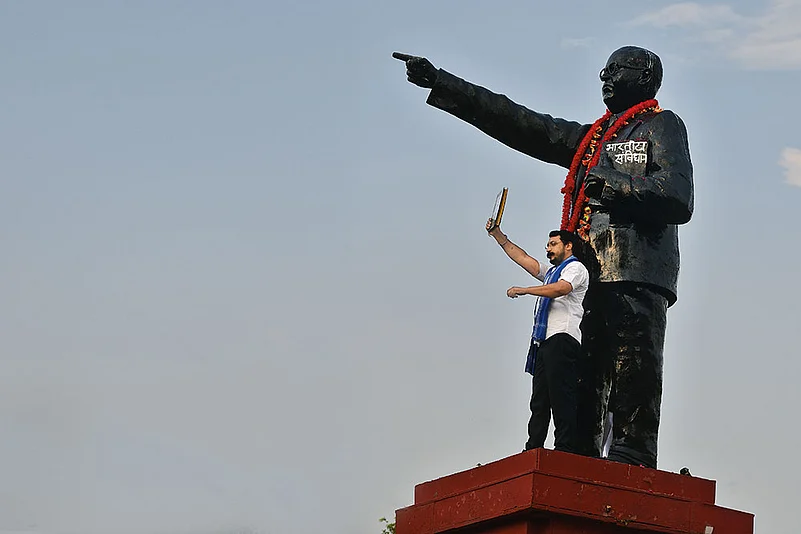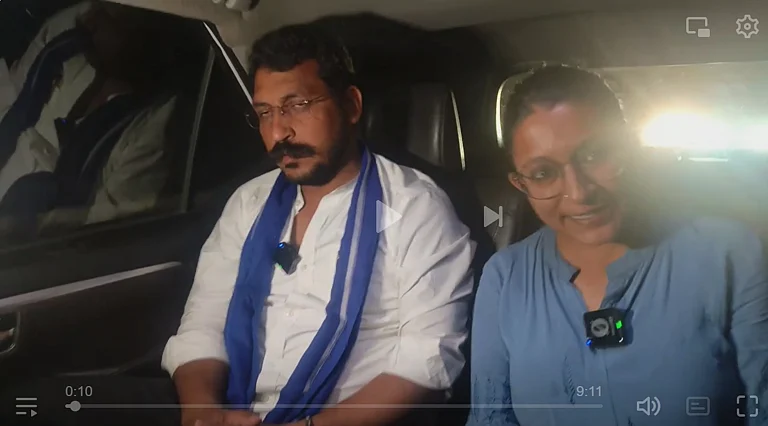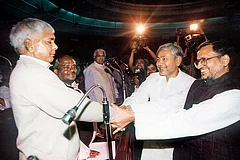It was in 2015, in the tiny village of Chhutmalpur, in Uttar Pradesh’s Saharanpur district, that Chandrashekhar Azad ‘Ravan’ first unveiled his might.
Dalit boys, studying at the local AHP Inter College, knocked on his doors to complain about getting assaulted by Thakur students. The Thakurs forcefully made them clean classrooms, they claimed.
“They would abuse Scheduled Caste (SC) students and assault us when they saw us sitting on benches or drinking water from common sources,” recalls Ankit Kumar, a former student of the college. “That’s when Dalit students decided to approach Chandrashekhar.”
A college alumnus, Chandrashekhar Azad was gaining a reputation as a local lawyer and Dalit leader.
A dominant caste in western Uttar Pradesh, the Thakurs, (Rajputs) owned the college and despite attempts at dialogue, college authorities and upper caste students remained hostile towards the Dalits.
“In those days, he had gathered a small group of followers and had started wearing his blue sash,” Kumar said. “The Bhim Army he used to lead, helped us with muscle power.” After the Bhim Army’s intervention, locals claimed that such caste atrocities stopped in the college.
The ‘Ravan’ had revealed himself.
Thus began the cult of Chandrashekhar Azad, co-founder of the ‘rebel’ band Bhim Army. Azad eventually consolidated his growing cadre into a political outfit, the Azad Samaj Party (ASP). In 2024, he has just been elected as a Member of Parliament after running an impressive independent campaign for the Nagina seat, winning against heftier opponents, including the Samajwadi Party (SP), Bahujan Samaj Party (BSP) and the Bharatiya Janta Party (BJP) by a significant margin.
On the walls of Azad’s home, several posters of Ambedkar, Kanshi Ram, Jyotirao Phule and the Buddha have now begun competing for space with his own posters. “Even in 2017, they tried to malign him and blame him for the violence in Saharanpur. He even got arrested, but we never stopped believing in his principles,” states one of his brothers.
Azad’s reputation as a firebrand leader fighting for Dalit dignity was solidified after the AHP Inter College incident. In the summer of 2016, a blue signboard with ‘The Great Chamar Welcomes You’ appeared outside Ghadkoli village on Dalit-owned land, infuriating the Rajputs. Local cops desecrated the sign and a nearby Ambedkar statue was smeared with ink. Dalits, 22 per cent of Saharanpur’s population, rallied under Bhim Army for justice.
Azad’s Army responded swiftly to incidents like the breaking of a Ravidas statue in Ghasoti village and the harassment of a Dalit youth by upper caste neighbours. Led by Azad, the large protests empowered locals and asserted Dalit identity. The Bhim Army also established Bhim Shalas to educate Dalit youth. In 2017, Azad gained national attention, cementing his role as the ‘Son of Saharanpur’.
To understand the import of the 2017 events, Outlook visited Shabbirpur, the epicentre of caste violence in Saharanpur. On May 5, Thakur and Dalit residents clashed after Dalits and Bhim Army members objected to a procession honouring Rajput king Maharana Pratap passing through Dalit areas and playing loud music near the local Ravidas temple. Tensions had previously flared when Rajputs objected to a Dalit-installed Ambedkar statue in the temple.
The clash resulted in one Rajput youngster’s death and 25 Dalit homes being burned. Azad’s Bhim Army convened a mahapanchayat to raise money for the victims on May 9, which turned violent after police lathi-charged the peaceful protesters, sparking days of clashes that had long-term impact on local politics.
Azad was accused of circulating messages on WhatsApp and social media, urging Dalits to join the protests. Arrested for instigating protests from Dalhousie, Himachal Pradesh, he remained in prison until September 2018. He was arrested again in 2020 for protesting against the Citizenship Amendment Act–National Register of Citizens in Delhi. The Saharanpur violence marked a turning point in his trajectory and a new chapter in subaltern political assertion in Saharanpur, previously Kanshi Ram and the BSP’s stronghold. Disillusioned youth who were previously with ‘Behenji’ Mayawati, rallied to Azad’s Bhim Army, responding to his call for a somewhat aggressive and initially apolitical assertion.
Contrarian to Parliamentarian
Arriving in Delhi as the new MP of Nagina following the 2024 Lok Sabha election results, Azad remained in his element, addressing party workers standing in the shadow of a 20-foot Ambedkar statue in the heart of the capital. “This win is for the Constitution and for Babasaheb, who wrote the Constitution,” he said, while brandishing a copy of the book, before showering his followers gathered at the foot of the statue with rose petals.
“When Time magazine featured me in its annual list of 100 Emerging Leaders Shaping the Future in 2021, Indian media and politicians made a lot of fun of me. This victory is therefore more special. It shows that if a leader perseveres and works with responsibility and consistency, people (voters) will notice,” Azad said.
In Nagina, where the majority are Muslim and Dalit, the ASP candidate won by a margin of 1.5 lakh votes, nearly the same as Prime Minister Narendra Modi in Varanasi. Azad, left out of the INDIA bloc allegedly over a seat distribution disagreement, stated: “Despite all the money, MPs, MLAs and infrastructure my rival parties had an independent son of the soil has won the seat. People have given the mandate.” He added that his late father, Govardhan Das, a government schoolteacher, who taught him about Ambedkar, Periyar and Phule, would have been proud.
“He always believed in Dalit emancipation through the democratic channel,” Azad said. Those close to the leader claim his father’s stories of facing discrimination from colleagues and students and his own experience as a Dalit student sparked his initial anger against the caste phenomenon. The anger intensified after losing his father to cancer in 2013. “He felt that if he had been privileged, he could have saved his father by getting him better treatment,” an aide of Azad and member of Bhim Army said.
In Saharanpur villages, which have witnessed the rise & fall of the BSP and now the rise of Azad, the mood is celebratory, but also reticent.
Since the win, the 37-year-old leader has been hailed by the media as the new face of Dalit-Bahujan leadership and the future of subaltern politics. Azad, however, claims that it is the people who will lead the movement. His victory in Nagina is nevertheless symbolic since the seat, before 2009, fell under the Bijnor constituency, which has sent Mayawati to Parliament. Azad, however, claims he is not in competition with the BSP.
“Kanshi Ram has been our neta, Behenji has been our leader, and they have all done a lot for the community. I cannot become like them. But I can work towards finishing or furthering the work that they started,” Azad said. Azad’s victory, when seen in conjunction with the way Dalit-Bahujan-Adivasi and Muslim residents of the nation voted in this election, underscores a churning among the subaltern, which seems to be looking for alternate leadership and representation.
One Nation, Many Minorities
Udit Raj, Congress leader and Dalit academic, admitted that there was a deep “void” in independent Dalit leadership, blaming the BSP for festering the rot.
“The first stage of the BSP was to create political awareness and train cadres on the ground to make way for political awakening. But once these people were awakened, they needed direction. Which was given to some extent, but eventually, Mayawati lost the game. The BSP started indulging in bribery, flattery and casteism,” Raj, a former MP, told Outlook.
He further added that Kanshi Ram had started with a big umbrella that included SC/ST, OBC and even minorities.
“But slowly, the party became narrower and eventually became the party of one particular sub-caste—the Jatav Chamars, to which Mayawati belonged. One sub-caste cannot fight the fight against the caste system,” Raj asserted.
He emphasised that no single caste could come to power alone; a coalition is necessary. In UP, the INDIA bloc benefited from the consolidation of pichda (backward), Dalit, and alpasankhyak (minority) communities. In contrast, Bihar’s lack of such a coalition led EBCs to support the BJP, rendering the Muslim-Yadav combine ineffective. He noted that expecting any caste or community to independently win mass elections is unrealistic in today’s democracy. Even in UP, the BSP usually formed coalitions, with a single majority government being a rare exception. This coalition strategy reflects the broader reality of India’s political landscape, Raj observed.

Congress MLA Jignesh Mevani, who emerged as a young, independent Dalit leader alongside Azad following the 2016 Una flogging incident, stated that while the Dalit-Bahujan community is becoming more aware, it still lacks the ability to form its own electoral organisation or strategies. He emphasised the need for alignment with mainstream parties to survive at a national level. Mevani added that the community is now looking towards Congress and Rahul Gandhi for leadership, as both have shown a genuine commitment to working for the marginalised and upholding the Constitution.
“Dalits identify with the Constitution at a very personal level. Our father wrote it. It has to be protected at all costs and the Congress’ commitment to preserving the Constitution as opposed to the BJP’s, which wanted to change, it has resonated deeply with the community,” Jignesh Mevani states.
The Vadgam MLA from Gujarat, who won the 2017 elections as an independent before joining Congress in 2021 and winning again in 2022, believes that while many independent players may achieve success and their efforts are commendable, they still face significant challenges. “At a national level, only the Congress has the potential and ability to bring forth a consolidation among Dalit-Bahujan-Adivasi voters,” he said.
Azad, who was snubbed by the INDIA bloc, said that Dalit-Bahujan society is an “enlightened one, thanks to the awakening brought by Babasaheb and we have seen their political aspirations shift in this election. But that is not because of the INDIA bloc, as they claim.”
“The parties (that are) part of INDIA have been fighting elections for a long time. We (ASP) have been politically active for just the past few years and in the last 1.5 years, we have worked specifically on ground issues like education, empowerment of Dalit-Bahujan youth and cultivation of analytical thought and mental prowess,” Azad asserts.
Meanwhile, in the villages of Saharanpur, which have witnessed the rise and decline of the BSP and now the rise of Azad, the mood is celebratory, but also reticent.
“We hope he works for the community and the people whose contributions sent him to Parliament,” Rachna, 31, the widow of Sonu in Shabbirpur, stated.
Sonu was arrested along with Azad in 2017 and slapped with the stringent National Security Act (NSA) for allegedly causing unrest. He was out on bail when he died by suicide in 2019. His family claims he cracked under false allegations and persistent pressure to attend hearings and defend himself in court for something he did not do.
“Some others in this village still have FIRs against them for supporting Bhim Army-led protests. The Bhim Army was active initially, but they (have) stopped coming. The FIR against my husband was false, but it was not dropped,” Rachna claimed.
Not far from her home, on the premises of the Ravi Das temple, the epicentre of the conflict, a now-defunct school of the Bhim Army houses the statue of Ambedkar, which became the core of discontent.
Local Ambedkarites now hope that with a Congress MP (Imran Masood) in power in Saharanpur and leaders like Azad and others from UP in Parliament, the villagers will now have the freedom to bring the statue out of lock and key and display it on the school’s campus. A local Ambekdarite activist, Paltu Ram, said that the leaders would soon get an opportunity to prove their allegiance to Babasaheb’s legacy on April 14, 2025, the Father of the Indian Constitution’s birth anniversary.
MORE FROM THIS ISSUE
“The coming years will be a test for the new Dalit leadership as well as the INDIA bloc to prove its commitment towards Dalit assertion,” he said.
(This appeared in the print as 'The Rise Of 'Ravan'')


































